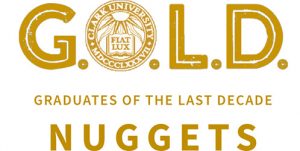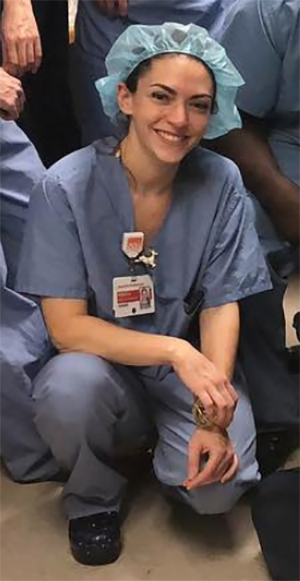Rebecca Rood Goldman double-majored in biology and studio art at Clark before earning her master’s in biology through the University’s accelerated degree program. She is a registered nurse at a hospital in New York, N.Y., one of the hardest-hit areas in the COVID-19 pandemic. We caught up with her to find out how the crisis has affected her.
 First of all, are you doing, Rebecca?
First of all, are you doing, Rebecca?
Currently, I’m a bit stir-crazy quarantined here at my apartment in Brooklyn with my boyfriend and my dog, but it could be worse! I’m glad to have a week off from work to catch up on sleep, as well as to process everything that has been going on in the world and at work.
You’re in New York, which has been the epicenter of the COVID-19 pandemic in the U.S. How has your personal life been affected by the pandemic?
My boyfriend, Roman, and I have been tuning in to N.Y. Governor Andrew Cuomo’s daily press conferences — like I imagine American families gathered around the radio during wartime decades ago. As a registered nurse working 3 to 4 nights per week on a Burn Intensive Care Unit (ICU), my personal life has long been affected by my chronic exhaustion, but amid this pandemic, life has changed a lot. I’m lucky that Roman is working from home as he’s taken on the majority of cooking, cleaning, and puppy-rearing. As a pediatric physical therapist, he has his work cut out for him, training parents in PT and keeping kids occupied long enough to get through virtual workouts over the internet. We only leave the apartment to walk the dog, go to the grocery store (gown- and glove-laden), and to bring groceries to Roman’s grandma.
 Can you tell us how you got to where you are since Clark?
Can you tell us how you got to where you are since Clark?
I met the woman who inspired me to go into nursing while I was pursuing my fifth-year master’s in biology, studying the three-spined stickleback fish at Clark. Eunice, a Brazilian immigrant whose first language is Portuguese, hired me to edit the grammar in her doctoral nursing papers. I went to work at the home of Eunice’s client at the time, Theresa, who was a 99-year-old retired schoolteacher with dementia and a laundry list of other medical problems that her doctors decided made for a hopeless prognosis.
When Theresa’s sister hired Eunice, an experienced, loving, and kind-hearted nurse, Theresa came out of her depression and went on to live several more enjoyable years. I watched Eunice tend to Theresa like she was her mother, always speaking lovingly to her, feeding her the most delicious home-cooked food, and tucking her in like a swaddled baby for her afternoon nap. After Eunice suggested for what seemed like the hundredth time that I go into nursing, telling me that “it is such a beautiful career,” I finally agreed.
So, what has it been like for you as a nurse at your hospital? Tell us more about what has changed since the pandemic took hold.
I work in the Upper East Side in Manhattan, and my hospital’s response to COVID-19 has been swift and ever-changing. Most of the units have been converted into ICUs, many of which have functioned by pulling staff from their home units. I floated the other day to a makeshift COVID-19 ICU, where each ICU nurse is partnered with a non-ICU RN. We were zipped into the unit donned fully in a gown, gloves, goggles, cap, a three-week-old N95 respirator, and a surgical mask, caring for three very sick, ventilated patients all night, except for when we left to guzzle down water or use the bathroom. If we needed supplies or medication, we told a ‘runner’ who would retrieve and deliver it through a zippered window, often by which time we had another item to request. Once inside the zipped-up wall, I didn’t sit still until 4:30 a.m., when I was able to finally step out for a quick bite.
Back to Clark briefly. You were a double major in Biology and Studio Art, which seems like an unusual mixture at first. How did you end up pursuing those and what was it like?
I remember at the beginning of my Clark life, Susan Foster, the head of the three-spined stickleback lab along with her husband, John Baker, was thrilled when they learned of my interest in art. “I would LOVE to have an artist in my lab,” she told me, and I was honored by her enthusiasm. Soon thereafter, with Susan as my academic adviser, I was awarded a scholarship to receive funding for a camera that I would use to spend the summer between semesters taking beautiful close-up photographs of the stickleback. Eventually, color variation in the male fish during the breeding season would become the subject of my fifth-year master’s thesis. So I feel fortunate in the fact that I was able to pursue and even bring together all my diverse interests at Clark.
I came across your web portfolio and Instagram, which I loved. This particular post caught my eye. What role has art played in your life, particularly during the pandemic?
I was afraid that pursuing art as a career might take the fun out of it for me, and while I’m not certain that this would have been the case, I’ve learned that there is an art to everything—even nursing. Working in a burn ICU, I see a lot of tragedy and sadness, and creating cartoons has been an outlet for me to both process and express what I experience at work and in life in a less serious way. I enjoy creating more than anything, and I am always thinking up new artistic projects that will bring me back into the meditative contentment of flow I experience during creation.
During this pandemic, it has been particularly difficult for me to come up with ideas, and it has been frustrating not knowing where to turn for my next one, especially during the quarantine. I have had to continuously remind myself to be patient with myself and the world at this trying time, and that processing my current experiences at work may not result in a physical product right away, but that it is the act of creating without expectation where true healing can occur.
While it still may be some time before the world is out of the woods in dealing with COVID-19, do you have any plans you’re looking forward to? What will be the first thing you do once you’re in the clear?
It’s funny — it took being in quarantine to really appreciate the things I usually take for granted, like bringing my puppy to the dog park or people-watching from a café window. And hugs. I am not usually a huggy person, but I miss them badly! I’m thrilled that we seem to be flattening the curve before the summer so that hopefully, there will be some time for outdoor reunions with family and friends in the sunshine. Even though this winter in New York was barely cold, by the time spring comes around, I am always in desperate need of some Vitamin D.
Finally, looping back to your work — as a nurse, other than social/physical distancing, washing hands regularly, and wearing a mask, do you have any other advice you can share with the Clark community?
Clarkies are smart, and I’m sure they’re on top of preventing the spread of the virus by taking personal protective measures. For me, the mental health aspect of quarantine has been the most challenging, and I can hardly imagine the challenges it has caused for the Clark community. My experience at Clark was enriched by face-to-face experiences — classes, events, trips, club meetings, mealtimes — that I know have fallen to the wayside during this pandemic. As a creature of habit and structure, I understand how lost we can feel when the basic foundation of our days disappear, and I want to let you know that you are not alone. Don’t ruminate or isolate during this time. Keep busy, meditate, and reach out to people, even without reason. We’re getting through it day by day and we will get through this, together.
